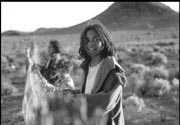TOLD WITH ALL the simplicity truth demands, Phillip Noyce’s Rabbit-Proof Fence is as much history lesson as movie. (The film opens Christmas Day at the Harvard Exit.) From 1905 to 1971, Aboriginal “half-caste” children in Australia—typically fathered by whites—were, as a matter of government policy, forcibly removed from their families and placed in camps to be trained as domestic servants.
It’s 1931, and 14-year-old Molly (Everlyn Sampi) lives with her mother and grandmother in remote Jigalong Depot (her white father is long gone), when policeman come to abduct her, along with her younger sister and cousin. The scene is almost biblical, a Job-like catastrophe that leaves Molly’s mother and grandmother weeping and wailing in the dust; the two women become part of the landscape, turned to stone with grief.
The order has come from faraway Perth, where A.O. Neville (Kenneth Branagh) holds the Orwellian title of Chief Protector of the Aborigines. In fact, as a slide-lecture luncheon with concerned ladies makes clear, his job is to protect racial separation. “Are we to allow the creation of a third race?” he demands. Each little half-caste child is a like an ink blotch in the neat columns and rows of his clerk’s mind. Branagh makes this villain a bland, iron-willed bureaucrat who needn’t beat children to inflict pain; one tick of his pen can determine their fate.
But Neville has met his match in Molly. She knows her way around the bush: how to track, how to hunt, how to survive. After being transported 1,500 miles south by train (where the three girls are caged like dogs), Molly decides to escape and walk home along the rabbit-proof fence that bisects Western Australia from north to south. From there, it’s a battle of wits between Neville in his map-strewn office and Molly in the field, as Fence turns into a chase movie, with the three girls pursued by an implacable but not unsympathetic Aboriginal tracker (David Gulpilil, Walkabout). Framed by Australian scenery that is by turns stark, spooky, and beautiful (thanks to cinematographer Christopher Doyle, In the Mood for Love), this homeward odyssey becomes a succinct 94-minute epic. And as she confidently guides her two charges, Molly becomes a small, skinny, knock-kneed epic heroine. You’d follow her, too.









